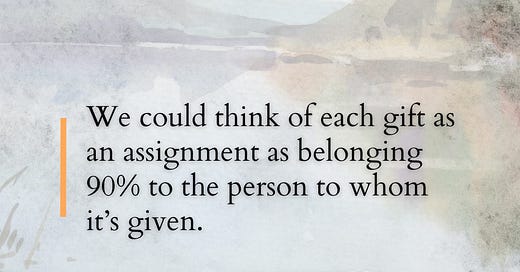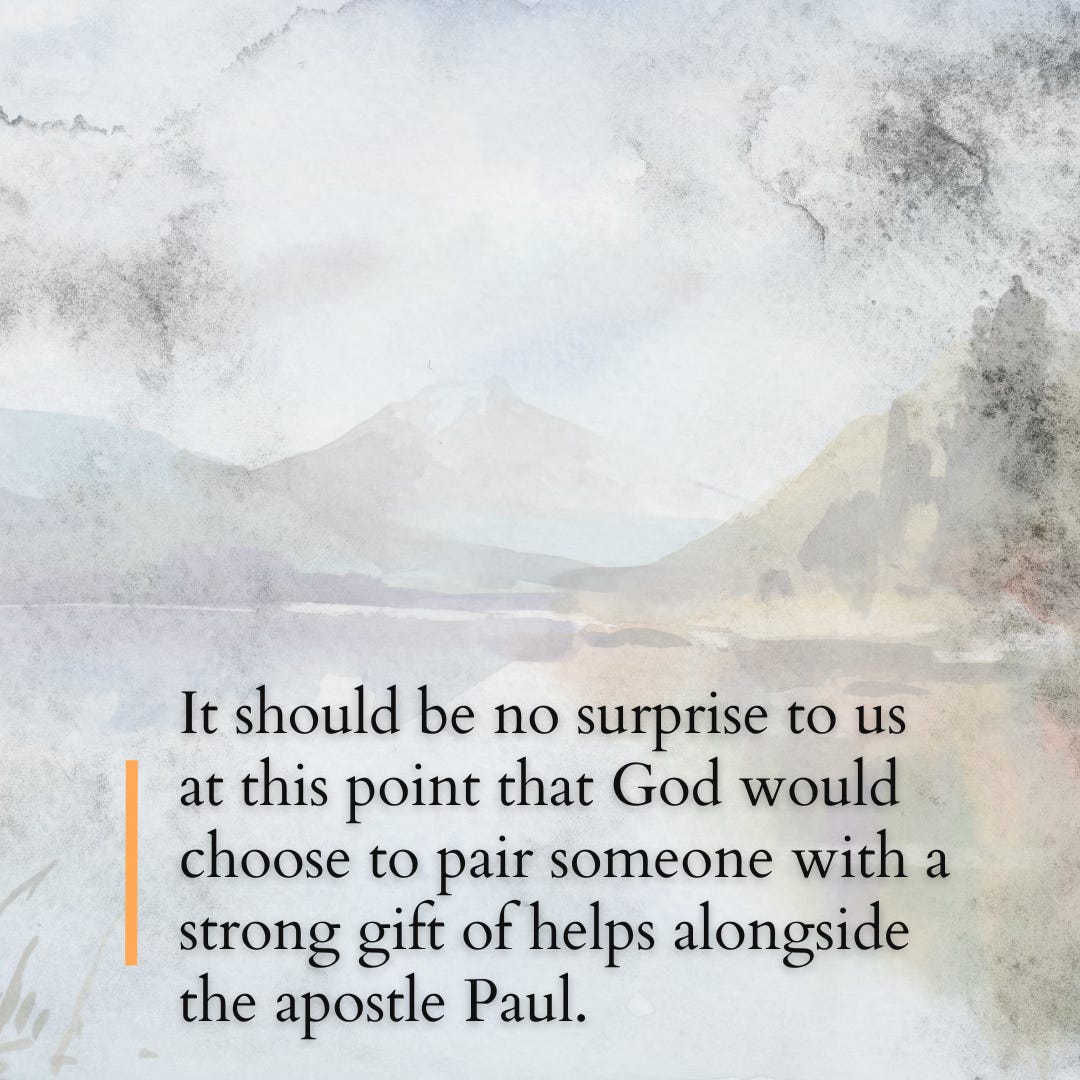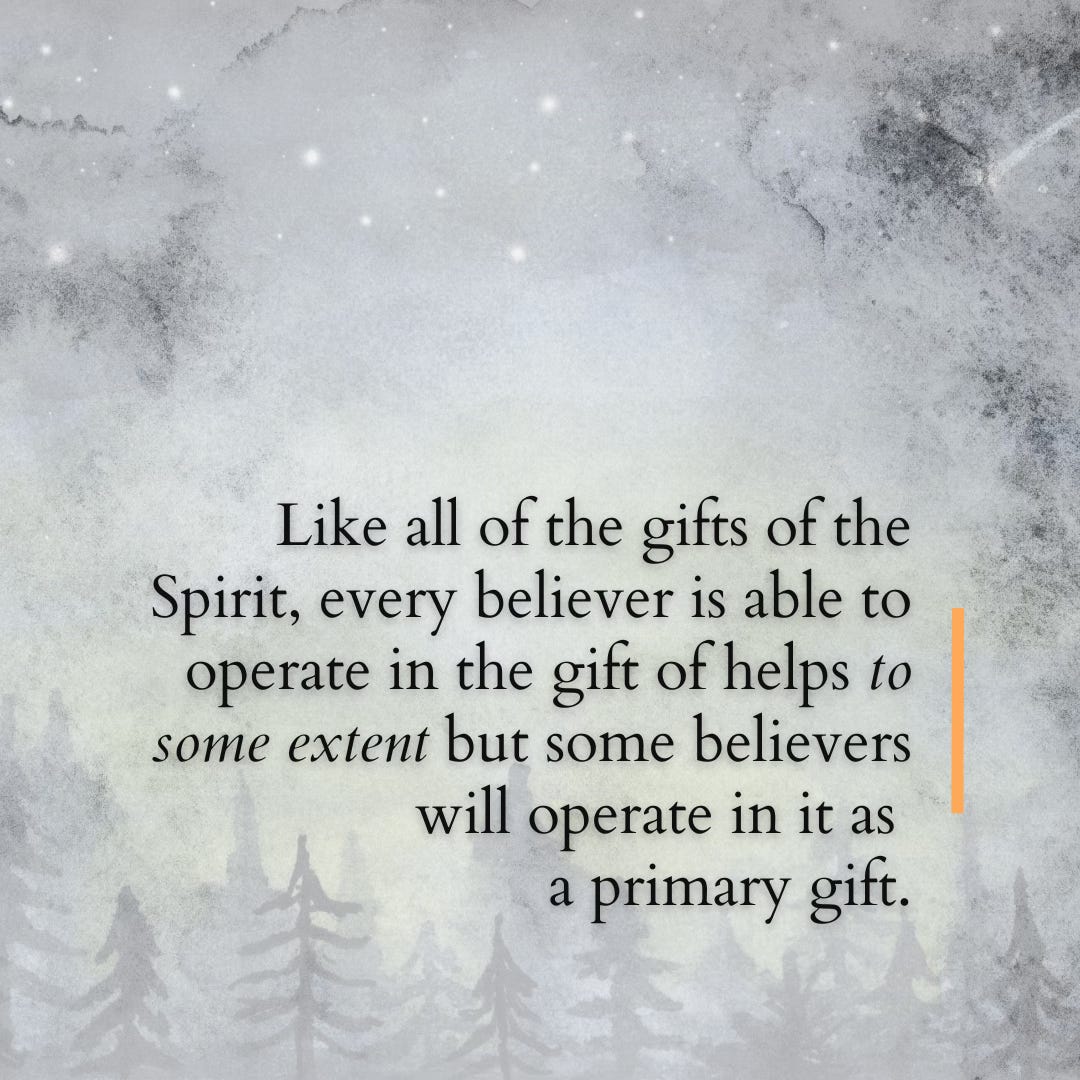In April of 2018, I was able to hear Rick Joyner, one of the fathers of the modern prophetic movement, speak in person. As a younger believer who was growing in hearing God’s voice, his weekly emails had been very influential in my life. However, I had never heard him speak in person.
I was surprised by his calm, grandfatherly demeanor as he spoke to a room of about 300 people. His comments had all the warmth and familiarity of an intimate conversation over coffee as he wandered from topic to topic and insight to insight.
At one point, he shared a conversation he had with the Lord about John 17 unity.
“Lord, what’s the most important gift for unity in the Body of Christ?”
The answer that came from the Holy Spirit surprised him: “It’s the gift of helps.”
The spiritual gift of Helps is spoken of in 1 Corinthians 12:28:
“And God has appointed in the Church first apostles, second prophets, third teachers, then miracles, then gifts of healings, helps, administrations, various kinds of tongues…”
Did you catch it in there? It’s easy to miss, hidden in the middle of a list of eight gifts.
As Rick humorously shared, he thought the gift of helps had to do with making coffee for church on Sunday morning. To be honest, that was the extent of my understanding of helps as well.
Understanding the Gift of Helps
The actual gift of helps is actually quite a bit more involved than that. It is a spiritual gift that enables the person who has it to assist others in using their gifts and completing their assignments.
All of us have spiritual gifts and assignments from the Lord. These are specific roles and responsibilities that we must carry and complete ourselves. They are burdens for us to carry. However, none of us can complete these God-given assignments alone. We all need help from others to accomplish what God has called us to do.
Let’s think about it in the context of a family. As a father, I have a special role and assignment from God specific to my children. It would be inappropriate for me to shirk my responsibility, or for someone else to try and usurp my special role. It is mine.
However, as a father I regularly run into problems I can’t solve. I need the help of other older men who serve as “father figures” for my children, especially their grandfathers. I also need the advice, counsel, and encouragement of other fathers. I desperately need the help of my wife if I am going to be adequate as a dad.
We could think of each gift as an assignment as belonging 90% to the person to whom it’s given. However, the remaining 10% is something the person could never accomplish no matter the level of gifting, grace, or natural talent. The gift of helps serves others by supplying what is lacking, by helping each part to complete their calling and assignment.
Galatians 6:2-5 is a clear example of how the gift of helps operates.
“Bear one another’s burdens and so fulfill the law of Christ. For if anyone thinks himself to be something when he is nothing, he deceives himself. But let each one examine his own work and then he will have rejoicing in himself alone and not in another. For each one shall bear his own load.”
Paul’s comments may be a bit confusing, but if we read the passage backward, it becomes clear.
Each of us has our own load to bear, our own load of responsibility, calling, and work to perform. We need to keep our eyes focused on that—are we bearing our load, or are we self-deceived?
However, to fulfill the law of Christ, to love one another as He has loved us, we need to help each other with our burdens. “Burdens” are the loads that are one person’s responsibility but are too heavy for them to lift on their own. The gift of helps swoops in to help with these burdens.
The Woman
Once we notice it, the gift of helps begins to appear everywhere throughout Scripture. First, we see it in Genesis 2:18:
“It is not good for the man to be alone. I will make a helper suitable for [comparable to] him.”
Eve was the first person with the gift of helps—and immediately her gift led to unity.
“Therefore, a man shall leave his father and mother and be joined to his wife and they shall become one flesh.” (Genesis 2:24)
Eve has come alongside Adam in a secondary but comparable role. It’s easy to see that Adam would be unable to carry out His God-given assignment, to “be fruitful and multiply and fill the earth and subdue it” apart from the help of Eve.
However, Adam was also unable to fulfill his priestly role of working and guarding the garden without Eve’s help.
In terms of the gift of helps, it is fair to say that women have an “unfair advantage” over men, since they possess it as part of God’s creation gift to them.
Holy Spirit
One of the Holy Spirit’s primary names is “the Helper.” We cannot follow God’s commandments on our own. We need divine help. We cannot love one another as we ought. We need God’s help. We cannot fulfill our God-given assignments and roles on our own. We need help. We cannot pray as we should. The list goes on and on.
The Holy Spirit is the one who helps us in our weakness. And yet, His help does not absolve us of responsibility for our actions and decisions. We have to walk in faith and express love for one another. We have to stand in the midst of a hostile world—this is our part. And yet, we would never finish our part apart from His help.
While it is true that the Holy Spirit helps us, in deeper and more ancient role, the Holy Spirit is also the bond of union between the Father and the Son.
The Helper is the one who is constantly serving, constantly in motion back and forth between the Father and the Son conveying love, fullness, and glory! From before the foundation of the world, the help of the Holy Spirit has been the bond of perfect unity in God Himself.
Joseph the Cyprian
There is one New Testament believer who we most clearly see operating in the gift of Helps. Not surprisingly, He was one of the best-loved members of the early Church. So much so that no one knows His given name, Joseph the Cyprian.
We all know him by his nickname, Barnabas, “Son of Encouragement.”
We first see Barnabas helping the Jerusalem church through a large financial gift in Acts 4. He is contrasted here with Ananias and Saphira. Giving financially is certainly part of the gift of helps.
However, we get a true sense of how Barnabas got his nickname in the story of the apostle Saul/Paul. After his conversion, the entire church in Jerusalem is afraid of Saul, and for good reason—he was just trying to murder them! However, Barnabas is the one who introduces him and vouches for him. Barnabas brings Saul into the fellowship of the apostles and leaders of the church.
Think about this: without Barnabas’ help, there would be no Paul.
Later, in Acts 11, Barnabas is sent to investigate the Gentile believers in Antioch. At the time, it was a major shock for the Jewish disciples that non-Jews were following their Messiah. There was a strong contingent in the early church urging these new converts to become circumcised and keep the ceremonial law of Moses. This was a make-or-break moment for the church. Thankfully, Barnabas, “a good man full of the Holy Spirit and faith” correctly identified that what was happening in Antioch was the work of the Holy Spirit.
The church in Antioch would serve as the greatest missional hub of the first century. No Barnabas, no Antioch.
Finally, Saul and Barnabas were the ones chosen by the Holy Spirit in Acts 13 as missionaries to carry the gospel throughout the Mediterranean region. It should be no surprise to us at this point that God would choose to pair someone with a strong gift of helps alongside the apostle Paul. This ministry partnership was a dynamic force multiplier.
No Barnabas, no Paul the Missionary, no early church mission movement.
From this, we can clearly see how the gift of helps works to strengthen, build, and unify the church.
Dead Ends: Assuming Someone Else’s Load (The problem of over-helping)
Of course, everyone loves to be helped. And this leads us to the dark side of the gift of Helps: taking on another’s load. It is very common for those who have the gift of helps to take on too much for another person, preventing them from fully shouldering their own load.
We see this often with mothers and children, where moms are hesitant to let children take appropriate responsibility for their age. The result is children that act younger than their proper age.
Ministries see this all the time: people step into help someone else, enjoy the feeling of doing good, and then within a few months are overcommitted and burned out. Or, those in the community with a bottomless well of neediness, usually people who are not walking in repentance, find the people with especially compassionate hearts. The needy people who refuse to help themselves end up sucking the others dry, and no one is helped.
The gift of Helps is about helping another person do some assignment or role for God that they can’t do for themselves. That’s why you’ll often find people who are making the most of their callings receiving the most help.
However, when helping moves into carrying someone else’s proper load, the helper is being unjustly burdened. This is a very common pitfall and must be guarded against with the help of the Holy Spirit.
How to operate in the gift of Helps
After hearing Ricks’ message, I immediately recognized I had the gift of helps and had been operating in it for years without knowing what it was. If you find that you receive greater joy in helping others achieve success than in your own success, this is one sign you may have the gift of helps.
Here are some keys to operating in this gift.
See yourself as a servant to all
“If you want to be great in God’s Kingdom, learn to be the servant of all.” Jesus understood the pathway to greatness was to serve everyone, and He lived as He spoke, giving His own life in service to each of us. If the Master lived this way, how much more so should we?”
As you go about your day and encounter people, see yourself as someone who is there to help and serve them. If you find this attitude odd or foreign to you, spending time learning to serve through a helping role such as a waiter, nurse, parent of small children, janitor, or teacher may help you to cultivate a servant’s attitude. If this seems too lowly or beneath you, remember it was good enough for the master, so its good enough for each of us.
Ask people “What are you concerned about” and “is there a way I could help?”
Often, when asked this question, people realize that they are the only one who can fully address their problem. Even just listening is a way of helping them and serving them. This is also a natural point where you can offer to pray for others, often an initial form the gift of helps expresses itself.
If they ask you for help, consider if you can do what they’re asking—ask the Holy Spirit for help if you’re not sure.
Consider if God is calling you to help the person in the way they’re asking. You’ll want to be generous but also consider the cost of following through and the danger both to you and to them of over-helping. This is where you’ll need the Holy Spirit to provide discernment.
If you’re not willing or available to help in the way they’ve asked, consider offering an alternative.
Explain that you’re not able to do what they’ve asked but offer to serve them in another way they may not have considered. Oftentimes, this is where you both begin to understand one another and the gift of helps can begin to operate effectively.
Like all of the gifts of the Spirit, every believer is able to operate in the gift of helps to some extent but some believers will operate in it as a primary gift.
As you’ll see once you begin to operate in it, the gift of helps absolutely kills division.
It’s common in the church for believers and especially leaders to experience envy or be suspicious of one another. However, when someone comes alongside to help you in a difficult task, it immediately communicates: “I’m for you.” This can take many forms, from financial blessing, to serving their family, to helping them in a ministry task.
When someone helps and serves us as a free gift, it’s hard not to love them and be drawn into unity together.









Loved this!